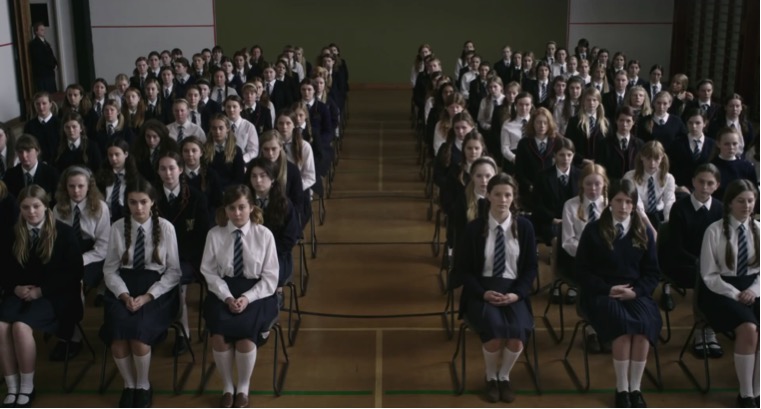
The Falling, dir. Carol Morley, UK, 2014, 102 mins, cert. 15
Two things lingered in my mind, one acridly the other more pleasurably, after watching The Falling, Carol Morley’s new film after the experimental based-on-a-true-story documentary Dreams of a Life. The first is a tenebrous line spoken by Maxine Peake’s character, the mother of the central schoolgirl Lydia (Maisie Williams), in the penultimate scene of the film. The other is, or rather are, Tracey Thorn’s ephemeral songs peppered throughout the film at the end of scenes like choric punctuation rocking the narrative along.
To single out the musical soundtrack and this moment is not to de-emphasize the sway The Falling exerts on the spectator as a whole. Whilst purposefully redolent of Picnic at Hanging Rock and Heavenly Creatures, especially the latter’s lusty hymn-singing opening, the film is different from those antipodean dramas, not just in its crisp, slightly barmy, autumnal Englishness. Tragedy strikes early and unexpectedly in The Falling, unlike the slow climb of dread that the spectator experiences over the course of Peter Jackson’s fantastical film.
The Falling charts a fictional outbreak of so-termed mass hysteria at a girls’ secondary school in rural Oxfordshire, just as the sixties are swinging to a close. The film initially follows the intense, fervent, friendship between Lydia and her vivacious best friend Abbie, the school troublemaker. She is fooling around with Lydia’s brother and seems to be more of a daughter to Lydia’s laconic hairdresser mother who admiringly remarks of her long blond locks. Lydia instead is fashioned with a messy brown bob, whilst her mother wears a grapefruit-orange beehive coiffed high and tight. This tonsorial buttoned-up-ness, almost anachronistic, acts as a visual metaphor for her repression of past traumas that she can barely articulate or acknowledge.
Further subtle distinctions are sketched. Abbie is seen with a shiny blood red leather school bag slung over her shoulder symbolizing recent abandonment of prelapsarian innocence. The other schoolgirls meanwhile carry drab brown satchels, nebbishly wear glasses and blazers, and have the hems of their skirts at the modest correct length. Soon enough these are being hitched up, literally and euphemistically.
The precise reason, or goal even, of Lydia’s blacking out is left open to speculation. In no time almost the whole school is collapsing like rag dolls, with even Miss Charon, the young female art teacher, succumbing. For this is a world practically devoid of men, much like Peter Strickland’s recent film The Duke of Burgundy, with the exception of the male science teacher, Lydia’s brother, Kenneth, and a paternalistic psychologist who is but briefly glimpsed. Nonetheless, these characters are viewed mostly within a sexual framework, if not by an active female gaze: Mr Hopkins, admired by the girls, makes a pass at Miss Charon and the boy is shown mostly in the context of his loose relationship with Abbie. The typical sexist gender hierarchy of mainstream cinema is flipped head over heels with the male characters objectified instead.
Reviews of the film have pointed out that the girls’ stunt could be conceived as a form of performance art, an expressive bout of sororal collaboration. Certainly the girls, instigated by Abbie, have set up the motley Alternative School Orchestra. In other scenes a teacher plays hymns on the piano in school assemblies. In the former instance the girls quite literally play Thorn’s unclassifiable music, whilst the instrumentation of the other nondiegetic cues – pianos and guitars – recalls the school piano’s honky-tonk tenor and Abbie’s guitar playing. As each girl begins her faint, the score is heard briefly on the soundtrack and is cut as they hit the floor. In these moments you can feel Morley and Thorn collaborating behind the camera, two artists working together, unspeakingly and synchronically, just as Lydia and the other girls appear to be doing so in front of it, silently orchestrating their own involuntary tumblings.
The Falling perhaps wraps up some narrative threads too tidily by its close and would have been more alluring if it has remained more allusive. But, still, this is a British female coming-of-age film par excellence, the best in some time. Let it make you go weak at the knees.
